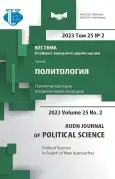After Post-Modernity: Discussion Points Against the Background of Global Transformations
- Authors: Evstafiev D.G.1,2, Tsyganova L.A.1
-
Affiliations:
- HSE University
- RUDN University
- Issue: Vol 25, No 2 (2023): Political Science in Search of New Approaches
- Pages: 293-307
- Section: IN SEARCH OF THE THEORETICAL FRAMEWORK OF THE POLITICAL
- URL: https://journal-vniispk.ru/2313-1438/article/view/322226
- DOI: https://doi.org/10.22363/2313-1438-2023-25-2-293-307
- EDN: https://elibrary.ru/WLRELY
- ID: 322226
Cite item
Full Text
Abstract
The transition of the basically local military-political crisis in the Western Eurasia into the real focus of global geopolitical transformations and civilizational confrontation. That has brought to the agenda the issue of degradation of the principles of universalities that were the basis for globalization in both: socio-political and socio-economic spheres thus demonstrating deepening interaction between them. The world is facing the perspective of competition of different models of development and their political and social localization that reflect the specifics of social-economic environment. The fact that global transformations became the result of interaction of the objective and subjective, contextual factors as well as sometimes were brought to reality through the interaction of political leaders brings us to the conclusion that the world is nowadays within the transitional era that contains several points of bifurcation of political nature that in turn drive for different models of socioeconomic development. The sharp nature of ongoing transformations reflects the situation when most of the paradigms and instrumental models that were regarded as axiomatically universal like institutional governance and representative democracy started to lose their relevance as political and socio-political management tools. The same is true about a bulk of global economic tools such as the universal protected nature of economic interdependence and international trade. But all that was the basis for the globalization. The system of global political and economic relations that has resided quite recently in the environment of nearly total universality started to lose synergy and integrity while forming complex localized formats in which political and socio-cultural factors play the leading role ahead of economic basis and socio-economic relationships. The research drives to the conclusion on the possibility of emergence of the two competing models claiming a global status the specifics of interaction between them and the key differences between them.
About the authors
Dmitry G. Evstafiev
HSE University; RUDN University
Author for correspondence.
Email: devstafiev@hse.ru
ORCID iD: 0000-0002-6276-0342
PhD in Political Sciences, Professor of the Institute of Media, Faculty of Creative Industries, HSE University; Professor of the Department of Theory of Law and State, RUDN University
Moscow, Russian FederationLubov A. Tsyganova
HSE University
Email: ltsyganova@hse.ru
ORCID iD: 0000-0003-2769-843X
PhD in History, Associate Professor of the School Communications of the Faculty of Creative Industries
Moscow, Russian FederationReferences
- Bespalaya, O.P. (2014). After postmodern: Altermodern, transmodern, postpostmodern. Humanitarian, socio-economic, and social sciences, (3), 20–22. (In Russian).
- Bourriaud, N. (2009). Altermodern. Tate Triennial 2009. London: Tate Publishing.
- Davydov, D. (2021). Postcapitalism and the birth of personalities. Moscow: RIPOL classic. (In Russian).
- Drucker, P.P. (2009). The future of industrial man. Piscataway: Transaction Publishers, Rutgers The State University.
- Dussel, E. (2002). World system and “trans”modernity. Nepantla. Views from South, (3.2.), 221–244.
- Evstafiev, D.G. (2022). New world order: the need for a “blank slate” and the geo-economic realities of today. The International Affairs. (4), 38–49. (In Russian).
- Evstafiev, D.G. (2023). Step beyond the threshold of the global world. Russia in Global Affairs, 21(2), 8–21. (In Russian).
- Giddens, A. (2003). Runaway World: How Globalization is Reshaping our Lives. NY: Routledge.
- Gaaze, K., Danilov, V., Dudenkova, I., Kralechkin, D., & Safronov, P. (Eds.). (2020). Goodbye COVID. Moscow: Publishing house of the Gaidar Institute. (In Russian).
- Held, D., McGrew, A., Goldblatt, D., & Perraton, J. (1999). Global transformations: Politics, economics and culture. Polity and Stanford University Press.
- Hoberek, A. (2007). Introduction: After postmodernism. Twentieth Century Literature, 53, 233–247.
- Jameson, F. (1989). Postmodernism, or, the cultural logic of late capitalism. Durham: Duke University Press.
- Kowalik, G. (2023). Post-Postmodernism, the “Affective Turn”, and Inauthenticity. Humanities, 12(1), 7. https://doi.org/10.3390/h12010007
- Krastev, I., & Holmes, S. (2020). The Light That Failed: Why the West Is Losing the Fight for Democracy. M.: Alpina Publisher. (In Russian).
- Kumar К. (2004). From post-industrial to post-modern society: New theories of the contemporary world, 2nd Edition. Wiley-Blackwell.
- McLuhan, М., & Powers, В. (1992). The global village: Transformations in world life and media in the 21st Century. Oxford University Press.
- Nealon, J.T. (2012). Preface: Why post-postmodernism? Post-Postmodernism, or, the cultural logic of just-in-time capitalism. Redwood City: Stanford University Press.
- Nye, J.S. (2018). How Sharp Power threatens Soft Power. The right and wrong ways to respond to authoritarian influence. Foreign Affairs. January 24. Retrieved March 15, 2023, from https:// www.foreignaffairs.com/articles/china/2018-01-24/how-sharp-power-threatens-soft-power.
- Schmidt, E. (2023). Innovation Power. Why technology will define the future of geopolitics. Foreign Affairs. March-April. Retrieved February 28, 2023, from https://www.foreignaffairs.com/united-states/eric-schmidt-innovation-power-technology-geopolitics.
- Turner, F.J. (2009). The frontier in American history. Moscow: Ves Mir. (In Russian).
- Weigner, P. (2008). Modernity as experience and interpretation. A new sociology of modernity. Cambridge: Polity Press.
- Wilterdink, N. (2002). The sociogenesis of postmodernism. European Journal of Sociology / Archives Européennes De Sociologie, 43.2, 190–216.
- Yergin, D. (2021). The new map: Energy, climate, and the clash of nations. Moscow: Intellectual literature. (In Russian).
Supplementary files









